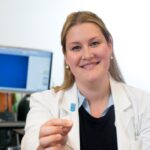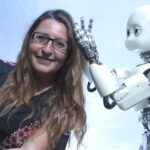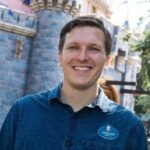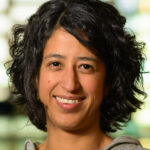Plenaries
Marcie O’Malley, Rice University, USA
Robots that teach and learn with a human touch
Monday, October 2nd, 11:30 am to 12:30 pm

Marcia O’Malley is the Thomas Michael Panos Family Professor in Mechanical Engineering, Computer Science, and Electrical and Computer Engineering at Rice University, where she is currently serving as Chair of the Department of Mechanical Engineering. She received her BS in Mechanical Engineering from Purdue University, and her MS and PhD in Mechanical Engineering from Vanderbilt University. Her research is in the areas of haptics and robotic rehabilitation, with a focus on the design and control of wearable robotic devices for training and rehabilitation. O’Malley was a recipient of both the ONR Young Investigator award and the NSF CAREER Award. More recently, she has been recognized with Rice’s Presidential Award for Mentoring, the Graduate Student Association Faculty Teaching and Mentoring Award, and the Rice University Faculty Award for Excellence in Research, Teaching, and Service. Her group has received Best Paper Awards in the IEEE Transactions on Haptics and the IEEE/ASME Transactions on Mechatronics. She is a Fellow of the American Society of Mechanical Engineers, the Institute of Electrical and Electronics Engineers, and the American Institute for Medical and Biological Engineering. She currently serves the Editor-in-Chief of the IEEE International Conference on Robotics and Automation Conference Editorial Board.
Yuto Nakanishi, GITAI, Japan
Challenge to Develop Space Robots for Building a Moonbase
Tuesday, October 3rd, 11:30 am to 12:30 pm

Chief Robotics Officer of GITAI. Former Founder & CEO of SCHAFT. After retiring as an assistant professor at the University of Tokyo Graduate School of Information Science and Technology (JSK Lab), he founded the bipedal robot startup, SCHAFT, the champion of DARPA Robotics Challenge Trials in 2013. He later sold the company to Google in 2013, and had led Tokyo biped platforms development team under Google X for 5 years. Now, he joined GITAI to develop space robots to build a moon base.
Matt Johnson-Roberson, Carnegie Mellon University, USA
Merging Paths: The Shared History and Convergent Future of AI and Robotics
Wednesday, October 4th, 11:30 am to 12:30 pm

Matthew Johnson-Roberson is director of Carnegie Mellon Robotics Institute and a Professor in the School of Computer Science. He received a PhD from the University of Sydney in 2010. He has held prior postdoctoral appointments with the Centre for Autonomous Systems – CAS at KTH Royal Institute of Technology in Stockholm and the Australian Centre for Field Robotics at the University of Sydney. He co-founded Refraction AI a last-mile autonomous vehicle delivery company. He has worked in robotic perception since the first DARPA grand challenge and his group focuses on enabling robots to better see and understand their environment.
Keynotes
Sven Behnke, University of Bonne, Germany
From Intuitive Immersive Telepresence Systems to Conscious Service Robots
Monday, October 2nd, 5:00 pm to 6:00 pm

Prof. Dr. Sven Behnke holds since 2008 the chair for Autonomous Intelligent Systems at the University of Bonn, Germany, and heads there the Computer Science Institute VI – Intelligent Systems and Robotics. He graduated in 1997 from Martin-Luther-Universität Halle-Wittenberg (Dipl.-Inform.) and received his doctorate in computer science (Dr. rer. nat.) from Freie Universität Berlin in 2002. In 2003 he did postdoctoral research on robust speech recognition at the International Computer Science Institute in Berkeley, CA. In 2004-2008 Professor Behnke led the Emmy Noether Junior Research Group “Humanoid Robots” at Albert-Ludwigs-Universität Freiburg. His research interests include cognitive robotics, computer vision, and machine learning. Prof. Behnke received several Best Paper Awards, three Amazon Research Awards (2018-20), a Google Faculty Research Award (2019), and the Ralf-Dahrendorf- Prize of BMBF for the European Research Area (2019). His team NimbRo has won numerous robot competitions (RoboCup Humanoid Soccer, RoboCup@Home, MBZIRC, ANA Avatar XPRIZE).
Michelle Johnson, University of Pennsylvania, USA
Towards more inclusive rehabilitation robots
Monday, October 2nd, 5:00 pm to 6:00 pm

Rebecca Kramer-Bottiglio, Yale University, USA
Shape-shifting soft robots that adapt to changing tasks and environments
Monday, October 2nd, 5:00 pm to 6:00 pm

Rebecca Kramer-Bottiglio is the John J. Lee Associate Professor of Mechanical Engineering and Materials Science at Yale University. Focusing on the intersection of materials, manufacturing, and robotics, her group is deriving new multifunctional materials that will allow next-generation robots to adapt their morphology and behavior to changing tasks and environments. She is the winner of multiple early career awards including the NSF Career Award, the NASA Early Career Award, the AFOSR Young Investigator Award, and the ONR Young Investigator Award. She was named to the Forbes “30 under 30” list for her approach to manufacturing liquid metals through printable emulsions and scalable sintering methods. She received the Presidential Early Career Award for Scientists and Engineers (PECASE) award, the highest honor bestowed by the U.S. government on outstanding scientists and engineers beginning their independent careers, for her development of robotic skins that turn inanimate objects into multifunctional robots. She serves as an Associate Editor of Soft Robotics and IEEE T-RO, as well as a Senior Editor of IJRR, and was General Chair of the IEEE International Conference on Soft Robotics (RoboSoft) in 2020 and 2021. She was named an IEEE Distinguished Lecturer in 2019, a National Academy of Engineering (NAE) Gilbreth Lecturer in 2022, and a National Academy of Science (NAS) Kavli Fellow in 2023. She also serves on the Technology, Innovation & Engineering Committee of the NASA Advisory Council.
Kostas Alexis, Norwegian University of Science and Technology, Norway
Resilient Robotic Autonomy: Experiences from the DARPA Subterranean Challenge
Tuesday, October 3rd, 5:00 pm to 6:00 pm

Kostas Alexis is Full Professor at the Department of Engineering Cybernetics of the Norwegian University of Science and Technology (NTNU). Highlights of his research include leading Team CERBERUS winning the DAPRA Subterranean Challenge and a host of contributions in the domain of resilient robotic autonomy – in perception, planning and control including learned navigation policies. Earlier research has included contributions in the ETH Zurich team that set the endurance world-record for UAVs in the below 50kg class with AtlantikSolar flying continuously for 81.5 hours. Since becoming professor, initially in the US and then in Norway, he has been the PI for a host of grants from NSF, DARPA, NASA, DOE, USDA, Horizon Europe, the Research Council of Norway and other public and private sources.
Serena Ivaldi, Inria, France
From humanoids to exoskeletons: assisting and collaborating with humans
Tuesday, October 3rd, 5:00 pm to 6:00 pm

Serena Ivaldi is a tenured research scientist in Inria, France, leading the humanoid and human-robot interaction activities of Team Larsen in Inria Nancy, France. She obtained her Ph.D. in Humanoid Technologies in 2011 at the Italian Institute of Technology and University of Genoa, Italy, and the French Habilitation to Direct Research in 2022 at the University of Lorraine, France. Prior to joining Inria, she was a post-doctoral researcher at UPMC in Paris, France, then at the University of Darmstadt, Germany. In 2023 she also spent two months at the European Space Agency as visiting expert. She is currently Editor in Chief of the International Journal of Social Robotics and has been serving as Associate Editor for IEEE Robotics and Automation Letters. She was Program Chair of the conferences IEEE/RAS Humanoids 2019, IEEE ARSO 2023, Tutorial Chair for CORL 2021, and will be General Chair of IEEE/RAS Humanoids 2024. She has been serving IEEE RAS as Associate Vice-president of MAB and co-chair of the ICRA Steering Committee. She was a proud judge of the ANA Avatar Xprize competition in 2022. She received the Suzanne Zivi Prize for excellence in research, the 2021 IEEE RA-L Distinguished Service Award as Outstanding Associate Editor, and was nominated in the 50 Women in robotics you need to know about in 2021.
Mario Santillo, Ford Motor Company, USA
Manufacturing Automation: A Look Towards the Future
Tuesday, October 3rd, 5:00 pm to 6:00 pm

Mario Santillo received the B.S. degree in Aeronautical and Mechanical Engineering from Rensselaer Polytechnic Institute in 2003, and M.S. and Ph.D. degrees in Aerospace Engineering from the University of Michigan in 2005 and 2009, respectively. Dr. Santillo has spent the past 15 years in both the aerospace and automotive industries developing fundamental research into usable products for end customers. At Ford Motor Company, Mario currently leads the robotics research efforts within the Research & Advanced Engineering Organization, where he focuses on the development and application of advanced control methods and artificial intelligence algorithms to next-generation robotic technologies in manufacturing and enterprise automation.
Moritz Bächer (Switzerland) and Morgan Pope (USA), Disney Research
Design and Control of Expressive Robotic Characters
Wednesday, October 4th, 5:00 pm to 6:00 pm


Moritz Bächer is the Associate Lab Director of Disney Research at Walt Disney Imagineering, where he leads a strategic program focusing on the development of novel model- and learning-based tools for the design and control of believable robotic characters. His core expertise is the optimal design and control of both soft and rigid systems, using a combination of differentiable simulation and reinforcement learning. Prior to joining Disney, he received his Ph.D. from the Harvard School of Engineering and Applied Sciences and his master’s degree from ETH Zurich.
Morgan Pope specializes in creating highly dynamic robotic performances for entertainment applications. While obtaining his PhD in the Biomimetics and Dextrous Manipulation Laboratory at Stanford, he built small robots that jumped, flew, perched, and climbed in various combinations. At Disney Research, he is the technical lead for the Stuntronics project, which enables actuated figures to perform untethered, high-velocity gymnastic actions robustly and repeatably.
Tetsuya Ogata, Waseda University/AIST, Japan
Deep Predictive Learning in Robotics: Optimizing Models for Adaptive Perception and Action
Wednesday, October 4th, 5:00 pm to 6:00 pm

Tetsuya Ogata received the B.S., M.S., and D.E. degrees in mechanical engineering from Waseda University, Tokyo, Japan, in 1993, 1995, and 2000, respectively. He was a Research Associate with Waseda University from 1999 to 2001. From 2001 to 2003, he was a Research Scientist with the RIKEN Brain Science Institute, Saitama, Japan. From 2003 to 2012, he was an Associate Professor at the Graduate School of Informatics, Kyoto University, Kyoto, Japan. Since 2012, he has been a Professor with the Faculty of Science and Engineering, at Waseda University. Since 2017, he is a Joint-appointed Fellow with the Artificial Intelligence Research Center, National Institute of Advanced Industrial Science and Technology, Tokyo. He is currently a member of the director board of the Japan Deep Learning Association (JDLA) since 2017, and a director of the Institute of AI and Robotics, at Waseda University since 2020.
Teresa Vidal-Calleja, University of Technology Sydney, Australia
Empowering Robots with Continuous Space and Time Representations
Wednesday, October 4th, 5:00 pm to 6:00 pm

Teresa Vidal-Calleja is an Associate Professor and Research Director at the Robotics Institute of the University of Technology Sydney (UTS). Teresa’s main research is in robotics perception combing estimation and machine learning methods. She is Program co-lead at the Australian Cobotics Centre, board member of the Australian Robotics and Automation Association, IEEE Senior member, Associate Editor of IEEE Transactions on Robotics, IEEE Robotics and Automation Letters and Field Robotics Journal, and one of Robohub’s “50 women in robotics you need to know about (2022)”. She obtained her PhD degree in automatic control, computer vision, and robotics from the Technical University of Catalonia. She holds a MSc in Mechatronics from CINVESTAV and a BEng in Mechanical Engineering from The National Autonomous University of Mexico. She was a postdoctoral fellow at LAAS-CNRS and the Australian Centre for Field Robotics before joining UTS.